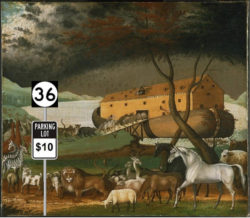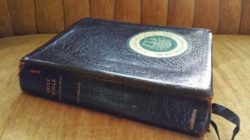
Greetings! The following is a re-post of my blog published four years ago on May 26, 2017. It’s about fundamentalist Christianity. Why drag it out of the moth balls now? I think it may contribute to our understanding of one aspect of ongoing upheaval in the USA and other countries that originates in what’s referred to as “the religious right.”
Good background on the religious right is found here.
Anyhow, I invite you to read on for some insight about fundamentalist Christianity. Some of you subscribers are new to my blogs, so this blast from the past may be the first time you’ve laid eyes on this material.
For more of my blogs about fundamentalism, click here.
Here’s the post from May 2017. Comments are welcome.
The Certain Curtain: How Fundamentalism Hooks
Protestant Fundamentalism and scholars who say useful things about it
Welcome to another Fundamentalist Friday. Yes, folks, we’re back to thinking about Protestant Fundamentalism and the scholars who have something helpful to say about it. While there are lots of kinds of fundamentalism (most religions have a branch that, among other things, demands a literal interpretation of and obedience to its doctrines and engages in black and white thinking) I only address Christian fundamentalism because I spent so long in that land of lost perspectives.
After I tore down the curtain of certainty that prevented me from considering a more realistic view of Scripture and of life, I spent a lot of time doing the nerdy thing: reading and thinking about my old fundamentalist views. I just wanted to understand the land I’d actually lived in for so long.
- Before we go on, if you want to catch up on any previous posts on this topic, click here → Fundamentalism posts.
The lost perspectives of fundamentalism
To start with, a Christian fundamentalist is a person who either never had the following perspectives or else lost them along life’s path. The first one lost? The understanding that nothing is for certain. That means things change. All the time. People change. Our understanding of reality changes. Even interpretations of the Bible change.
Another perspective lost: we can feel okay about uncertainty … we just have to expect it. But we’re human and change and uncertainty make us nervous. Change can be upsetting. And change comes with a requirement: we must adjust. My mother used to tell me about trees that bend when the wind blows. They’re the ones that last.
Change doesn’t change
Change! There’s an old saying from centuries before Christ that a philosopher named Heraclitus is known for articulating: you can’t step in the same river twice. In other words, because the water is always moving and the earth along the riverbank is always shifting, “the river” does not maintain a set identity. It’s not exactly the same river at this moment that it was even a second ago. Thanks, Heraclitus, for that insight. Too bad we have trouble applying that observable fact to much else in life, especially, it seems, when it comes to religion.
The hard truth is that we can’t be one-hundred percent certain that we know exactly what’s always going on in life since change is ongoing. Regarding the Bible, the same is true. We can never know everything about the Bible, or what all of it means EXACTLY, or that every word is true in the sense that it corresponds with observable “reality.” Some of it is myth, some of it beyond comprehension.
That’s okay with me, but it’s not okay for most fundamentalists. They take the Bible as literal truth (sometimes they admit there is [correction: there are instances of] figurative language) and that God’s Word never changes. Well, the fact is that [what] the Scriptures [are] and what we know about them isn’t as simple as fundamentalists think.

What Karen Armstrong can tell us about fundamentalist certainty
Maybe you’ve heard of the author of books about religions, Karen Armstrong. I don’t agree with her every opinion, but I have read many of her books and they are well researched and compelling.
In her book The Bible: A Biography (2007) she has this to tell us about fundamentalism and certainty. The first quote comes from a section describing the end of the nineteenth century.
“The rational basis of the modern world made it difficult—if not impossible—for an increasing number of Western Christians to appreciate the role and value of mythology. There was, therefore, a growing sense that the truths of religion must be factual and a deep fear that the Higher Criticism [studying the Bible’s history, authorship, and origin of its various texts] would leave a dangerous void. Discount one miracle [in the Bible] and consistency demanded that you reject them all. If Jonah did not spend three days in the whale’s belly, asked a Lutheran pastor, did Jesus really rise from the tomb?” (197)
“In 1881, Archibald A. Hodge, Charles’s son [Charles Hodge was a professor at the Presbyterian seminary at Princeton, New Jersey], published a defense of the literal truth of the Bible with his younger colleague Benjamin Warfield. It became a classic: ‘The scriptures not only contain but are the Word of God, and hence all their elements and all their affirmations are absolutely errorless and binding on the faith and obedience of men.’ Every biblical statement – on any subject – was absolute ‘truth to the facts.'” (199)
“… The belief in biblical inerrancy, pioneered by Warfield and Hodge, would, however, become crucial to Christian fundamentalism and would involve considerable denial. Hodge and Warfield were responding to the challenge of modernity but in their desperation were distorting the scriptural tradition they were trying to defend.” (199)
So, erecting a curtain of certainty about the Bible being literally true, and then being certain about that, is a relatively new phenomenon that influences a large portion of the Christian population in America today. This interests me because while I was in The Way International, the founder, Victor Paul Wierwille, made this view of the Bible seem as if it were the original one we must “get back to,” not a modern development.
A few serious words about what we don’t know
Some of you know I’m a big fan of Bart D. Ehrman, professor at the University of North Carolina at Chapel Hill. In Jesus, Interrupted, he writes about the history of the Biblical texts. To me, if a person says he or she believes the Bible, it makes sense to know the where, when, how, and why facts about it. I suggest checking out Jesus, Interrupted as a source for finding helpful information to answer those questions. But if you are or have been a fundamentalist, be ready to learn what you’ve not known before.
Ehrman points out that
“This kind of information is relevant not only to scholars like me, who devote their lives to serious research, but also to everyone who is interested in the Bible—whether they personally consider themselves believers or not. In my opinion this really matters. Whether you are a believer—fundamentalist, evangelical, moderate, liberal—or a nonbeliever, the Bible is the most significant book in the history of our civilization. Coming to understand what it actually is, and is not, is one of the most important intellectual endeavors that anyone in our society can embark upon.” (xi, xii).
Click here to find more → Bart Ehrman
You can be certain of one thing, I am your writer on the wing,
Charlene
Cheers






Kathleen Brandt
Thanks for this, Charlene. Of course it’s no secret that there was very little that was new in anything V.P. Wierwille taught, but still it’s interesting to see his inerrancy doctrine showing up in 1881– a good 80 years before he taught it!
Charlene L. Edge
This inerrancy doctrine really came onto center stage for me when I worked in The Way’s biblical research department and realized inerrancy just didn’t hold water. That’s a long story, but readers of Undertow know most of it.
Cheers.
Steve Lig
Agree with you on Bart Ehrman. “Misquoting Jesus” changed my whole perspective on biblical fundamentalism.
Charlene L. Edge
Thanks for chiming in here, Steve.
I love, “Misquoting Jesus” too. Eye-opening and healing for me.
Linda Goddard
Thank you, Charlene, for sharing this good information! I want to know more about Ehrman.
Let us continue to keep our focus on helpful, credible sources of information on the Bible.
Billy Williams
One of the hallmarks of my recovery from my old cult…i.e. the Way…and sexual assault years…which recovery did not really start for decades…was that my very late waking up from my old thinking was energized not by getting back into the Bible…but by real life examples of living the principles I always believed to be in it. And it started with realizing and finally believing all the hurts that came…to others and myself. It started with the testimony of someone who was in my 8th corps, as well as in my state during our apprentice year; that would be Kristen Skedgell’s “Lowing the Way”. Were such hurts come from the Loving God I was presumably learning about? Or were they coming from VPW’s and the Way’s interpretation of what God is like? That question came more into my head when the person who had become my best survivor friend helped me recall my own assault and break my silence, which did not happen until the Fall of 2017. Meanwhile, another friend who had worked with her for years started me thinking about my faith…more than superficially anyway…when she keynoted a secular women’s conference here in town with the Serenity Prayer. The idea that we don’t know everything about God, but can strive to learn more about what we can and cannot receive and do, felt refreshing, because I had been seeing her doing her best job of being one of those living examples I was learning from. In fact, she gave that talk just before she decided to make a run for Congress, a run she had to give up because of constant pain from an old injury.
After breaking my silence, I felt I was ready to get into the Bible again, with out the Way or Way-like teachings. My view on where those Way teachings came from was aided by a book called “Undertow”. So I became invioved in a group called “Celebrate Recovery” The good of that was that I could get into reading the Bible without someone constantly telling me what every word, verse, and chapter meant, so I thought. It turned out to be not that simple, just a whole lot less structured that was the Way. Anyway, that group was interrupted by the pandemic, then, at least locally, disrupted by politics.
Still more recently, at the start of the new year, another friend I had met in person just in 2019, started a Bible Study facebook page. (She had also worked with the other two non-Way friends.) This page had been very relaxed so far, leading to minimally structured input and discussion on what we have read for that particular day. The friend who started the page gives occasional input as one of the rest of us, not as a teacher or preach, including even discussions on what is literal and what is not. So far I feel good about this, because I sill think the Bible is a good source for my faith As in the Serenity Prayer, I want to learn to accept what I cannot change, try to change what I can, and gain the wisdom to know the difference.